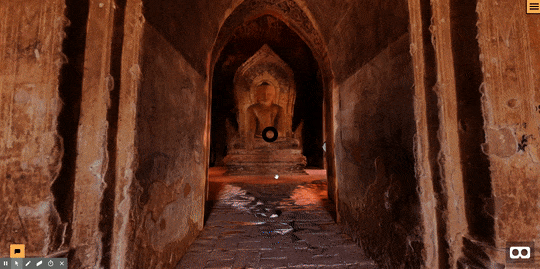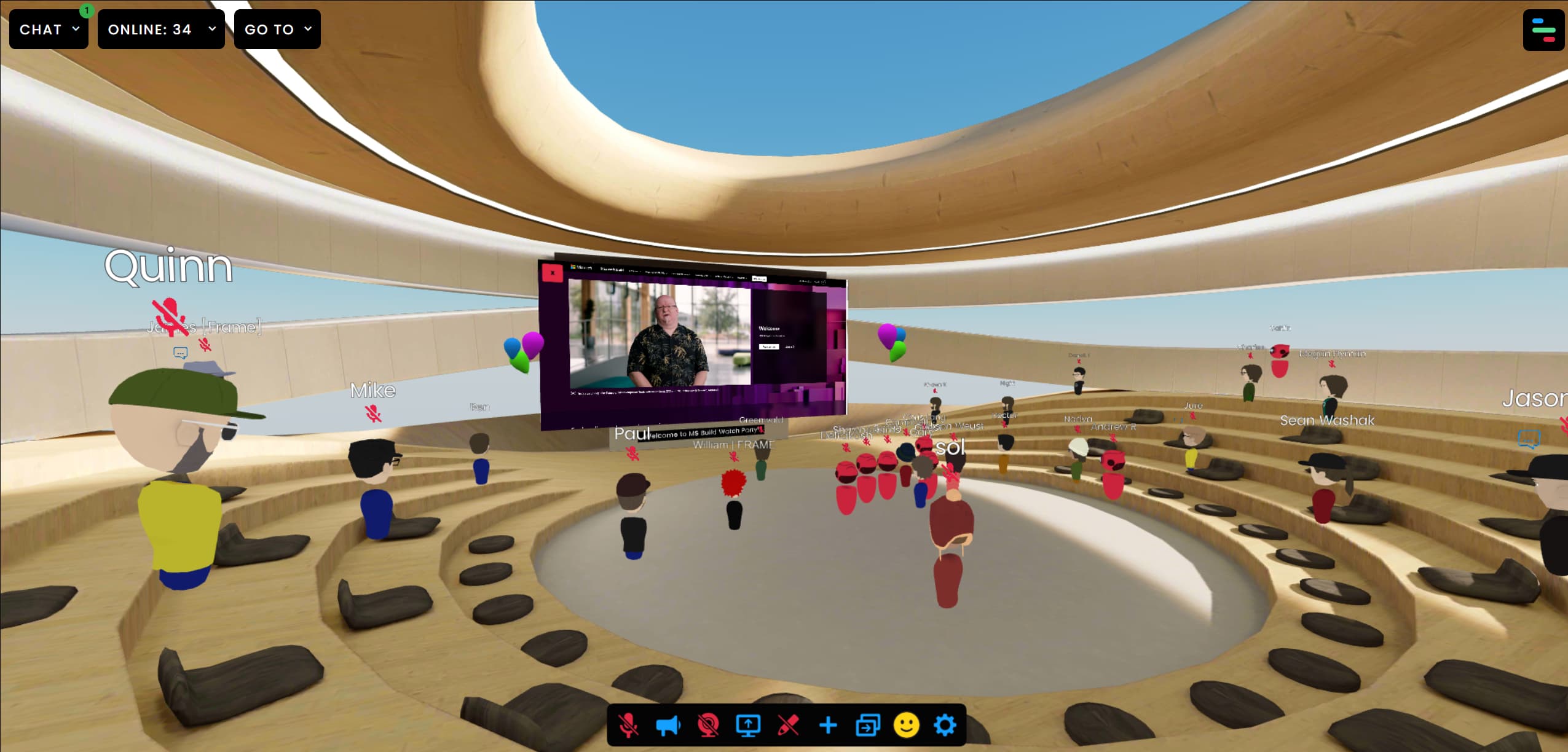There Are Now Hundreds of Collaborative VR Tools - What's Next?
Note - this post was written by Gabe Baker, Product Manager for FRAME
Each week, a new "virtual office" or "metaverse" startup announces that they are "revolutionizing" work, play, or events. Each month, another huge company announces that "Hey! We're cool and we're doing that too!" While the hyped up marketing lingo doesn't do anyone any favors, some of them might be right. Many of them will be proven wrong.
In any case, excitement is back in the virtual air, even as more people start breathing real air again with their colleagues in real, physical workplaces. The remote work macro trend has received a jolt and is still going strong, and so services are popping up to meet demand, and to meet the perception that people want different tools than video chat.
From the big company perspective, Facebook is keeping the VR money pipes flowing. At this point, they are just throwing money at people who will build social experiences with their tool, Horizon. Microsoft made their Microsoft Mesh announcement, which despite being a little hazy on the details, demonstrated their excitement about the collaborative 3D space. Even the ever-cautious Apple is barely able to hide that they are soon to enter the immersive collaboration space in the way that Apple tends to enter a space - a little late, but with a transformative bang.
Many of the smaller players in this space (including FRAME) started out with somewhat unique value propositions that, given the relentless flooding of the market, are no longer unique to a handful of apps. "Ours is the only one that runs on the web!" Nope. "Ours is the only one that lets you do whiteboard stuff!" Nope. "Ours is the only one that lets you do vague crypto stuff or is somehow powered by crypto!" Definitely nope. This list goes on.
Are some people still doing special stuff, or providing a unique combination of features and designs that sets them apart? Definitely. Is FRAME one of them? I like to think so. Is it getting harder to do this? Absolutely. In addition to that, I think that many of the features that companies are still able to tout right now as competitive advantages are not sustainable advantages. To the extent that those companies are resting on those laurels, they are in danger.
The barrier to entry in this space is incredibly low, and they've gotten a lot lower in the past ten years. This is undoubtedly a good thing. There are even cottage industries burgeoning up just to support the growing ecosystem of 3D communication tools. Want to have some other service handle avatars for you? Take your pick of avatar services and plugins. Need a voice or video API? Plug in to one of the hundreds out there, some of which are specifically designed for spatial audio. Need an out-of-the-box API to handle multi-user sync, or persistence? You're not short of choices. Want to even give your app a layer that helps it interface with other products in the metaverse? There are services and APIs that are doing this too (e.g. Will Murphy on the FRAME team also works on Immers Space).
Companies are making the car parts. Some assembly required. Use Unity, Unreal, WebXR, or countless others as the "engine", get some funding in the tank by instilling some FOMO in a boss or that angel investor who got an Oculus Quest over the holidays, and welcome to the party.
Even the parts that still seem to be just out of reach for everyone, like MASSIVE SCALE virtual worlds, are being commoditized and API-ified by people who are prudently focused on building the car parts. FRAME will actually see a pretty significant boost in the scale that we can support this year, and we are going to achieve this in a few ways by leveraging our in-house expertise. In other words, we're crafting some of the car parts ourselves (we craft others beyond this, too). This effort might even have us ahead of that particular game for a few months.
But if we or anyone else plan as if this or things like it are going to be key sustainable competitive advantages - we're toast. Heck, I might even decide to eventually sell that car part we made to others even as we're selling the car we made with it.
Before I start to sound too cantankerous, I'd like to point out that I'm not just bitterly complaining about the increased competition in the space. From the FRAME perspective, I'm being forced to think harder about what we're building and offering, the markets we want to go after, and how we can innovate in a number of realms (not just the product itself). These are good things and fun challenges.
I am genuinely assuming that in a year or two, the effort it will take up to spin up a massively scalable, decent social 3D collaboration product will be next to nothing. I can either dread the inevitable or embrace it. If I want to stay in this space while keeping my head on my shoulders - I've got to embrace it.
So, what are we going to do about it? What's next? While we have lots of interesting and powerful things coming from a product perspective, I want to talk more broadly about navigating this increasingly crowded space.
1. Innovate with Precision
For one, the burden is on me and everyone else to innovate in ways that aren't yet being packaged into the car parts for everyone else to use. This is hard. Identifying those areas is tough, but many of them come into focus as I think about particular markets we could hone in on. For example, if FRAME focused exclusively on the education space, or made a fork of FRAME just for large events, I think we could innovate in those areas in a way that sets us further apart from the pack. The same could be said for design review, sales demos, and team building. We have to pick our battles wisely.
I think many products will be forced to narrow in on a particular segment in order to do anything interesting or valuable compared to every other product out there. Some are already doing this quite well, and others are attempting to do just about every collaborative/social activity under the sun.
2. User Experience Matters...A Lot
User experience and user interface concerns are critical, not secondary. People like using something that is easy to use but still feels uniquely delightful. If a user interface feels cookie cutter (like as if you just used that car part off the shelf), your product will look and feel derivative. This isn't always a deal-breaker for a user, but in a space where differentiation is getting harder and harder, it needs more attention.
3. Think Beyond Product
Given that hundreds of products already provide the core value of a 3D collaborative space, beyond doing my best with my team to keep FRAME unique and compelling, we need to innovate in other areas that can provide real value to our users and community. Some of these areas I think are particularly ripe for innovation: our business model, the way that we interact with and educate our users and clients, and the way that we can cultivate growth and market our product.
Imagine the ocean of products out there looking for users - boats prowling the seas on the hunt for buyers or guests. Beyond the boat itself, some users will be attracted to the way they can get their hands on it (or, feet in this case). That might simply be the price point, but it could be a different, compelling way that an exchange of value is established (business model innovation). Some users will be attracted to the friendly nature of the staff on the boat, or the way that after just a few hours with the boat and its manual, they are able to figure out all the neat things about it and use it to the fullest (the way we interact with and educate our users). Some people will just pick the boat that they happen to see. After all, people can only look at so many boats in a day, and there are only so many spots at the dock (the way we cultivate growth and market our product).
I need to firmly rid myself of the notion that product is the only locus of innovation or determinant of success. I'll admit - I'm a product-centric guy and this doesn't come naturally to me. So, I'll be working on it with my team.
4. Stay Hungry, Stay Nimble
Final thoughts:
We are hungrier than ever at FRAME to succeed in this space and the more great competition we see, the more keen we are to make our mark and deliver unique value to users. We know that we're going to need to be nimble and adaptive, more so than ever.
As many of the core components of collaborative VR get fully commoditized, and companies fully adapt to that reality, this space is going to get a lot more interesting. The companies that have lazily forked Mozilla Hubs and done nothing else besides put their logo on it won't last - and good riddance to them. Those that just assemble the car parts without bringing anything else to the table will need to do more. But those that are digging deep to figure out how to make their vehicles move in bold new directions will persevere.
There's no better time to enter the space. I'm excited to be in it.
You might Also Like

A Bagan Temple in Social, Cross-Platform VR
Bringing an ancient Buddhist temple into social VR for shared exploration.
Read More
Record, Transcribe, and Summarize Meetings in Frame
Meeting recordings, transcripts, and summaries.
Read More.jpg)
Apple and the Spatial Web: A Winding Path Towards a Bright Future
It's been a long road, but spatial Safari is coming.
Read More